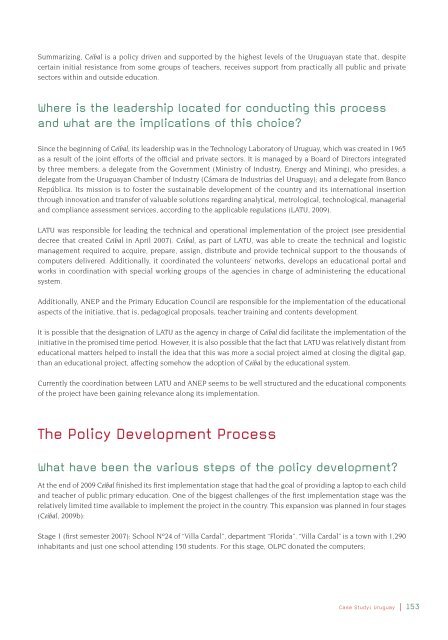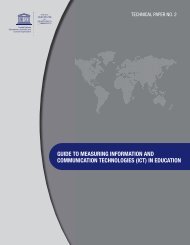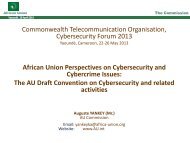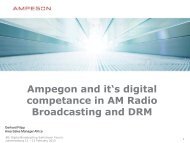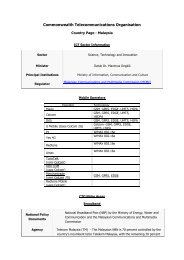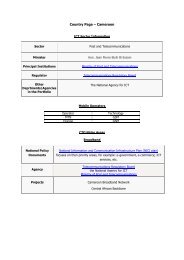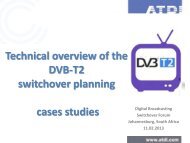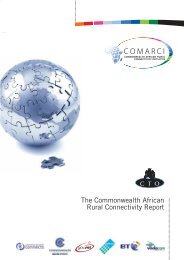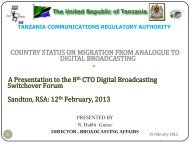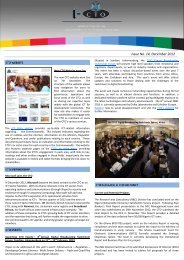Transforming education: the power of ICT policies - Commonwealth ...
Transforming education: the power of ICT policies - Commonwealth ...
Transforming education: the power of ICT policies - Commonwealth ...
Create successful ePaper yourself
Turn your PDF publications into a flip-book with our unique Google optimized e-Paper software.
Summarizing, Ceibal is a policy driven and supported by <strong>the</strong> highest levels <strong>of</strong> <strong>the</strong> Uruguayan state that, despite<br />
certain initial resistance from some groups <strong>of</strong> teachers, receives support from practically all public and private<br />
sectors within and outside <strong>education</strong>.<br />
Where is <strong>the</strong> leadership located for conducting this process<br />
and what are <strong>the</strong> implications <strong>of</strong> this choice?<br />
Since <strong>the</strong> beginning <strong>of</strong> Ceibal, its leadership was in <strong>the</strong> Technology Laboratory <strong>of</strong> Uruguay, which was created in 1965<br />
as a result <strong>of</strong> <strong>the</strong> joint efforts <strong>of</strong> <strong>the</strong> <strong>of</strong>fi cial and private sectors. It is managed by a Board <strong>of</strong> Directors integrated<br />
by three members: a delegate from <strong>the</strong> Government (Ministry <strong>of</strong> Industry, Energy and Mining), who presides; a<br />
delegate from <strong>the</strong> Uruguayan Chamber <strong>of</strong> Industry (Cámara de Industrias del Uruguay); and a delegate from Banco<br />
República. Its mission is to foster <strong>the</strong> sustainable development <strong>of</strong> <strong>the</strong> country and its international insertion<br />
through innovation and transfer <strong>of</strong> valuable solutions regarding analytical, metrological, technological, managerial<br />
and compliance assessment services, according to <strong>the</strong> applicable regulations (LATU, 2009).<br />
LATU was responsible for leading <strong>the</strong> technical and operational implementation <strong>of</strong> <strong>the</strong> project (see presidential<br />
decree that created Ceibal in April 2007). Ceibal, as part <strong>of</strong> LATU, was able to create <strong>the</strong> technical and logistic<br />
management required to acquire, prepare, assign, distribute and provide technical support to <strong>the</strong> thousands <strong>of</strong><br />
computers delivered. Additionally, it coordinated <strong>the</strong> volunteers’ networks, develops an <strong>education</strong>al portal and<br />
works in coordination with special working groups <strong>of</strong> <strong>the</strong> agencies in charge <strong>of</strong> administering <strong>the</strong> <strong>education</strong>al<br />
system.<br />
Additionally, ANEP and <strong>the</strong> Primary Education Council are responsible for <strong>the</strong> implementation <strong>of</strong> <strong>the</strong> <strong>education</strong>al<br />
aspects <strong>of</strong> <strong>the</strong> initiative, that is, pedagogical proposals, teacher training and contents development.<br />
It is possible that <strong>the</strong> designation <strong>of</strong> LATU as <strong>the</strong> agency in charge <strong>of</strong> Ceibal did facilitate <strong>the</strong> implementation <strong>of</strong> <strong>the</strong><br />
initiative in <strong>the</strong> promised time period. However, it is also possible that <strong>the</strong> fact that LATU was relatively distant from<br />
<strong>education</strong>al matters helped to install <strong>the</strong> idea that this was more a social project aimed at closing <strong>the</strong> digital gap,<br />
than an <strong>education</strong>al project, affecting somehow <strong>the</strong> adoption <strong>of</strong> Ceibal by <strong>the</strong> <strong>education</strong>al system.<br />
Currently <strong>the</strong> coordination between LATU and ANEP seems to be well structured and <strong>the</strong> <strong>education</strong>al components<br />
<strong>of</strong> <strong>the</strong> project have been gaining relevance along its implementation.<br />
The Policy Development Process<br />
What have been <strong>the</strong> various steps <strong>of</strong> <strong>the</strong> policy development?<br />
At <strong>the</strong> end <strong>of</strong> 2009 Ceibal fi nished its fi rst implementation stage that had <strong>the</strong> goal <strong>of</strong> providing a laptop to each child<br />
and teacher <strong>of</strong> public primary <strong>education</strong>. One <strong>of</strong> <strong>the</strong> biggest challenges <strong>of</strong> <strong>the</strong> fi rst implementation stage was <strong>the</strong><br />
relatively limited time available to implement <strong>the</strong> project in <strong>the</strong> country. This expansion was planned in four stages<br />
(Ceibal, 2009b):<br />
Stage 1 (fi rst semester 2007): School Nº24 <strong>of</strong> “Villa Cardal”, department “Florida”. “Villa Cardal” is a town with 1,290<br />
inhabitants and just one school attending 150 students. For this stage, OLPC donated <strong>the</strong> computers;<br />
Case Study: Uruguay | 153


